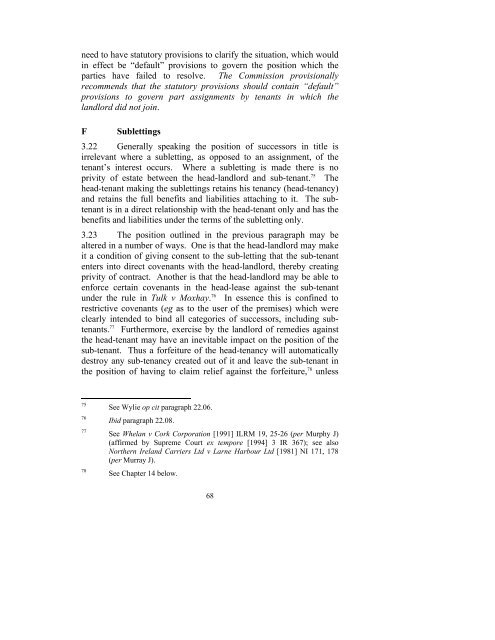Consultation Paper on the General Law of the Landlord and Tenant
Consultation Paper on the General Law of the Landlord and Tenant
Consultation Paper on the General Law of the Landlord and Tenant
You also want an ePaper? Increase the reach of your titles
YUMPU automatically turns print PDFs into web optimized ePapers that Google loves.
need to have statutory provisi<strong>on</strong>s to clarify <strong>the</strong> situati<strong>on</strong>, which wouldin effect be “default” provisi<strong>on</strong>s to govern <strong>the</strong> positi<strong>on</strong> which <strong>the</strong>parties have failed to resolve. The Commissi<strong>on</strong> provisi<strong>on</strong>allyrecommends that <strong>the</strong> statutory provisi<strong>on</strong>s should c<strong>on</strong>tain “default”provisi<strong>on</strong>s to govern part assignments by tenants in which <strong>the</strong>l<strong>and</strong>lord did not join.F Sublettings3.22 <strong>General</strong>ly speaking <strong>the</strong> positi<strong>on</strong> <strong>of</strong> successors in title isirrelevant where a subletting, as opposed to an assignment, <strong>of</strong> <strong>the</strong>tenant’s interest occurs. Where a subletting is made <strong>the</strong>re is noprivity <strong>of</strong> estate between <strong>the</strong> head-l<strong>and</strong>lord <strong>and</strong> sub-tenant. 75 Thehead-tenant making <strong>the</strong> sublettings retains his tenancy (head-tenancy)<strong>and</strong> retains <strong>the</strong> full benefits <strong>and</strong> liabilities attaching to it. The subtenantis in a direct relati<strong>on</strong>ship with <strong>the</strong> head-tenant <strong>on</strong>ly <strong>and</strong> has <strong>the</strong>benefits <strong>and</strong> liabilities under <strong>the</strong> terms <strong>of</strong> <strong>the</strong> subletting <strong>on</strong>ly.3.23 The positi<strong>on</strong> outlined in <strong>the</strong> previous paragraph may bealtered in a number <strong>of</strong> ways. One is that <strong>the</strong> head-l<strong>and</strong>lord may makeit a c<strong>on</strong>diti<strong>on</strong> <strong>of</strong> giving c<strong>on</strong>sent to <strong>the</strong> sub-letting that <strong>the</strong> sub-tenantenters into direct covenants with <strong>the</strong> head-l<strong>and</strong>lord, <strong>the</strong>reby creatingprivity <strong>of</strong> c<strong>on</strong>tract. Ano<strong>the</strong>r is that <strong>the</strong> head-l<strong>and</strong>lord may be able toenforce certain covenants in <strong>the</strong> head-lease against <strong>the</strong> sub-tenantunder <strong>the</strong> rule in Tulk v Moxhay. 76 In essence this is c<strong>on</strong>fined torestrictive covenants (eg as to <strong>the</strong> user <strong>of</strong> <strong>the</strong> premises) which wereclearly intended to bind all categories <strong>of</strong> successors, including subtenants.77 Fur<strong>the</strong>rmore, exercise by <strong>the</strong> l<strong>and</strong>lord <strong>of</strong> remedies against<strong>the</strong> head-tenant may have an inevitable impact <strong>on</strong> <strong>the</strong> positi<strong>on</strong> <strong>of</strong> <strong>the</strong>sub-tenant. Thus a forfeiture <strong>of</strong> <strong>the</strong> head-tenancy will automaticallydestroy any sub-tenancy created out <strong>of</strong> it <strong>and</strong> leave <strong>the</strong> sub-tenant in<strong>the</strong> positi<strong>on</strong> <strong>of</strong> having to claim relief against <strong>the</strong> forfeiture, 78 unless75767778See Wylie op cit paragraph 22.06.Ibid paragraph 22.08.See Whelan v Cork Corporati<strong>on</strong> [1991] ILRM 19, 25-26 (per Murphy J)(affirmed by Supreme Court ex tempore [1994] 3 IR 367); see alsoNor<strong>the</strong>rn Irel<strong>and</strong> Carriers Ltd v Larne Harbour Ltd [1981] NI 171, 178(per Murray J).See Chapter 14 below.68
















